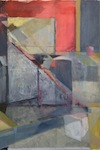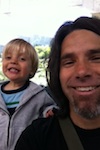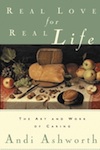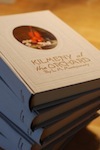The irony of conversing with a stranger is that your individual lives always look very different and personal, but then you strip away the nuances to find a common likeness buried inside of diversity. Take away money and geography and we’re all just flesh and blood and soul. We’re all dealing with sin and forgiveness, love and hate, glory and shame. The big ideas remain. Life creates another day of history and the babies keep on coming. People dream their dreams. The young grasp at reinventing the wheel and the maturing masses learn to let go of such reinventions one breath at a time.
All in Bookish
 Despite my deep longing to be among the ranks of what I call the “true” artists, the kind who can effortlessly dress themselves in wonderfully whimsical, sophisticated clothing and decorate their homes with lovely abstract art that has deep roots in poetic allusion, I am really too poorly dressed and my home too pathetically decorated to ever count myself among their ranks.
Despite my deep longing to be among the ranks of what I call the “true” artists, the kind who can effortlessly dress themselves in wonderfully whimsical, sophisticated clothing and decorate their homes with lovely abstract art that has deep roots in poetic allusion, I am really too poorly dressed and my home too pathetically decorated to ever count myself among their ranks.Preamble to an Odyssey
Too often when you reach the top of anything, a mountain or a career, you find yourself standing alone or with very few others. Attrition travels the length of the ascent. It may be that only the highly skilled and the very wounded make it to the top. The highly skilled arrive because they’re more prepared for success than anyone else in the world. The skilled-but-deeply-wounded arrive not because they’re so majestically prepared for success but because they cannot stop moving. Even the peak does not stop them. Space is their next frontier. Final frontier? Hardly.
 I did want to tell my story kindly. I love my family. It delights me that that is how it has come across. I see no benefit for myself or others if I tell a story filled with anger and bitterness. Frankly, I think if I am unable to extend mercy to the people in my story, and receive the gifts they have given, even ones that have caused suffering, then I should wait until I am able to process, to heal more deeply.
I did want to tell my story kindly. I love my family. It delights me that that is how it has come across. I see no benefit for myself or others if I tell a story filled with anger and bitterness. Frankly, I think if I am unable to extend mercy to the people in my story, and receive the gifts they have given, even ones that have caused suffering, then I should wait until I am able to process, to heal more deeply.Interview Series: MAKING — A Conversation with Kim Thomas
I absolutely think that the history of frequent moves, adjusting, new people — all that affects my making today. It takes a lot of courage to be a maker of any kind. It requires many decisions, commitments, and lonely times in your head. The nomadic life built up my courage for new things and change, sort of immunized me to sameness, and made me invite the adventure of mystery and unknown.
 The mountain doesn’t look like the mountain when you’re on it. Often enough, it doesn’t look like much at all. Like standing only a few inches away from one of Georges Seurat’s pieces, all I see are points of color. It’s just dots, at least that’s true to some degree. Yet I’d venture a guess that Seurat was not primarily or initially moved by a vision of tiny marks on a canvas but that he took up the brush and diligently, meticulously made those millions of tiny marks because he was moved by a vision of sand and water or skin and eyes.
The mountain doesn’t look like the mountain when you’re on it. Often enough, it doesn’t look like much at all. Like standing only a few inches away from one of Georges Seurat’s pieces, all I see are points of color. It’s just dots, at least that’s true to some degree. Yet I’d venture a guess that Seurat was not primarily or initially moved by a vision of tiny marks on a canvas but that he took up the brush and diligently, meticulously made those millions of tiny marks because he was moved by a vision of sand and water or skin and eyes. But what if things were just that simple? What if we insist on complicating things that really aren’t that complicated? What if this life was something where having a good horse, being able to tell right from wrong, and knowing where a man could find fresh water and how to handle yourself in a fight were among the most important things you could know, and you took everything else as it came? Is there such a story to tell anymore?
But what if things were just that simple? What if we insist on complicating things that really aren’t that complicated? What if this life was something where having a good horse, being able to tell right from wrong, and knowing where a man could find fresh water and how to handle yourself in a fight were among the most important things you could know, and you took everything else as it came? Is there such a story to tell anymore? Van Gogh said something like this: “The highest form of art is fashioning human lives.” I’m not sure if that’s the exact quote, but it’s certainly true. You’re creating all the time — creating a mood, creating a meal, making a sick person comfortable, creating a celebration, nurturing compassion, creating a welcome — you’re always making. When our imaginations are captured by the idea of creating good stories in the lives of the people we’ve been given to love, a world of possibility opens up.
Van Gogh said something like this: “The highest form of art is fashioning human lives.” I’m not sure if that’s the exact quote, but it’s certainly true. You’re creating all the time — creating a mood, creating a meal, making a sick person comfortable, creating a celebration, nurturing compassion, creating a welcome — you’re always making. When our imaginations are captured by the idea of creating good stories in the lives of the people we’ve been given to love, a world of possibility opens up. “We do not have to live as if we are alone.” One would not be hard pressed to interpret a large percentage of Bruce Springsteen’s extensive catalogue of songs over the last thirty-something years as attempts to communicate the same message. The role of an artist in our world today surely includes, among other things, the task of expanding our moral imagination . . .
“We do not have to live as if we are alone.” One would not be hard pressed to interpret a large percentage of Bruce Springsteen’s extensive catalogue of songs over the last thirty-something years as attempts to communicate the same message. The role of an artist in our world today surely includes, among other things, the task of expanding our moral imagination . . . You have been betrayed by your body, when you had gone around all this time thinking you and your body were one thing, inseparable, a winning team. And although the doctor’s approach you with their sterile, shining instruments and unfailing clinical cool, still you panic, and inside you feel hurt.
You have been betrayed by your body, when you had gone around all this time thinking you and your body were one thing, inseparable, a winning team. And although the doctor’s approach you with their sterile, shining instruments and unfailing clinical cool, still you panic, and inside you feel hurt. Because you are hurt.
And although doctors now have treatments for most maladies, what comes after that — the healing — is something one must do alone.
 I had this notion of a swallow, the image of love and sacrifice, winging through a little arched door, such as might give on to The Secret Garden or Wonderland or perhaps even the forgotten rose bed in Burnt Norton. I thought immediately of Jean “Davy” Vanuaken, my real-life heroine of A Severe Mercy, and her chosen “low door” of obscurity and service for the love of Christ. I thought of all the beauty that has ever gone unlauded by the world, and the love that breathes life into it and the joy that rises from it like the incense of a thank offering — and I knew not only what I wanted to do, but why.
I had this notion of a swallow, the image of love and sacrifice, winging through a little arched door, such as might give on to The Secret Garden or Wonderland or perhaps even the forgotten rose bed in Burnt Norton. I thought immediately of Jean “Davy” Vanuaken, my real-life heroine of A Severe Mercy, and her chosen “low door” of obscurity and service for the love of Christ. I thought of all the beauty that has ever gone unlauded by the world, and the love that breathes life into it and the joy that rises from it like the incense of a thank offering — and I knew not only what I wanted to do, but why.  I love to watch
I love to watchas the earth changes its picture
for me
rhubarb emerges
for a moment
an alien brain pushing through the soil
then unfurls
 If indeed “the medium is the message” there is something lacking, something too sterile and quick about holding hard plastic instead of bending a dog ear, penciling a note, or marking a beautiful scene or character to trace as my daughter likes to do. Indeed, a well-worn storybook is perhaps the most compelling evidence that our best reading — our best learning — is not primarily compelled by will but by love.
If indeed “the medium is the message” there is something lacking, something too sterile and quick about holding hard plastic instead of bending a dog ear, penciling a note, or marking a beautiful scene or character to trace as my daughter likes to do. Indeed, a well-worn storybook is perhaps the most compelling evidence that our best reading — our best learning — is not primarily compelled by will but by love. There is never a simple answer to the question I am frequently asked: “What do you do with your time when not touring or playing music?” Perhaps the better question is, Why do you do what you do? Why cull together (more like cobble) a mishmash income year-in and year-out — each year the same, each one different, each one in hindsight a miracle? The years carry with them the same struggle, the same burden, only clothed in different hides. Some years are grimier, more pungent than others.
There is never a simple answer to the question I am frequently asked: “What do you do with your time when not touring or playing music?” Perhaps the better question is, Why do you do what you do? Why cull together (more like cobble) a mishmash income year-in and year-out — each year the same, each one different, each one in hindsight a miracle? The years carry with them the same struggle, the same burden, only clothed in different hides. Some years are grimier, more pungent than others. That word: struggle.
 We, as creators, need to acknowledge that we are ourselves created, that we are characters in a bigger story. And when we empty ourselves of the responsibility for striking the creative spark, when we understand our “gift” as something given to us, something we don’t deserve and can’t earn, when we open ourselves up and confess our weakness in our own sub-creation, we are open to the perfection of a strength far greater than our own.
We, as creators, need to acknowledge that we are ourselves created, that we are characters in a bigger story. And when we empty ourselves of the responsibility for striking the creative spark, when we understand our “gift” as something given to us, something we don’t deserve and can’t earn, when we open ourselves up and confess our weakness in our own sub-creation, we are open to the perfection of a strength far greater than our own.Returning to a Writing Life
In this season, I’m hoping to find my way with fewer people in the house and more solitude. I’m not naïve enough to expect perfection, but I do need time. As any writer knows, you must show up regularly to get your work done. It must be given priority and long hours of concentration. I write best if I start first thing in the morning, which means pushing everything else aside: walking past the dirty dishes in the kitchen sink, not starting a load of laundry, resisting the urge to restore order in the household, and going directly to my desk.
 I wash them by hand,
I wash them by hand, soap and rinse and wring
until the skin lifts from my fingers,
swirls like slip lace into a pair
of barely there stockings, which cover,
however flimsily, blue veins
like drainpipes, like boxes that line old cellars.
 We learned after a few days how to keep moving and enjoy the scene at the same time, how to discern which pictures we needed to take and which we could do without, and how to tell stories from home while enjoying alien country. But why did we feel the need amid all that natural beauty to request personal anecdotes or stories about family members back home? Were we merely searching for distraction from blisters, muscle aches, and wheezing lungs?
We learned after a few days how to keep moving and enjoy the scene at the same time, how to discern which pictures we needed to take and which we could do without, and how to tell stories from home while enjoying alien country. But why did we feel the need amid all that natural beauty to request personal anecdotes or stories about family members back home? Were we merely searching for distraction from blisters, muscle aches, and wheezing lungs?  Reading was an escape, but not an unhealthy one. It didn’t enable me to deny my grief or the strain our family was under. It didn’t distract me from my children or make me wish for another life.
Reading was an escape, but not an unhealthy one. It didn’t enable me to deny my grief or the strain our family was under. It didn’t distract me from my children or make me wish for another life. In fact, the simple act of allowing myself the luxury of literature served to inspire my days with my children. I was a better thinker — more happy, more energized, and more full. Reading served as a wholly reparative act, something that offered renewal at a time when everything felt out of sorts.
 The liturgy suits people like me and Johnny, and many in the congregation — the artful-minded, craving visuals and symbols. We walk in the door to dip our fingertips in cold, holy water; trace a cross from our forehead to our chest; light a candle cupped in red glass to symbolize prayers weighing heavy on our hearts. I take a wooden pew under the St. Catherine of Alexandria stained glass. There is a still, sweet reverence under the wooden nave which looks like an upturned ark, drying out from a tragic flood. As we do “the people’s work” in peaceful repetition — kneeling, bowing, crossing — we embed Scripture and worship into our souls and movements.
The liturgy suits people like me and Johnny, and many in the congregation — the artful-minded, craving visuals and symbols. We walk in the door to dip our fingertips in cold, holy water; trace a cross from our forehead to our chest; light a candle cupped in red glass to symbolize prayers weighing heavy on our hearts. I take a wooden pew under the St. Catherine of Alexandria stained glass. There is a still, sweet reverence under the wooden nave which looks like an upturned ark, drying out from a tragic flood. As we do “the people’s work” in peaceful repetition — kneeling, bowing, crossing — we embed Scripture and worship into our souls and movements.

















